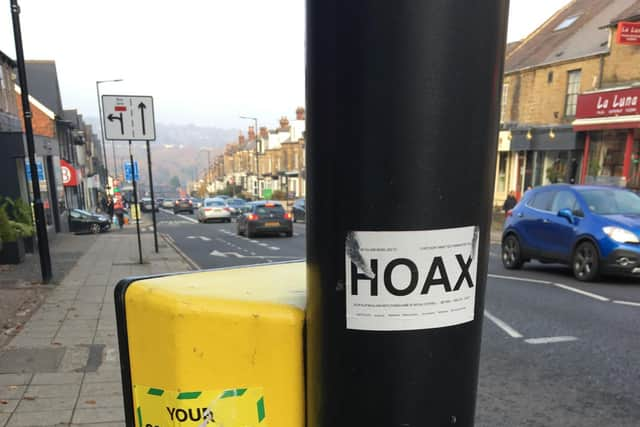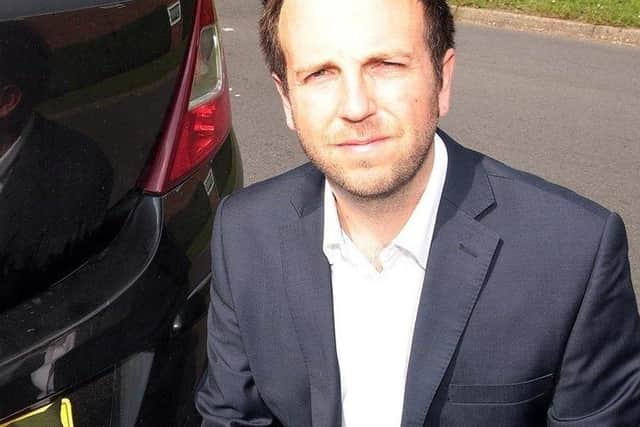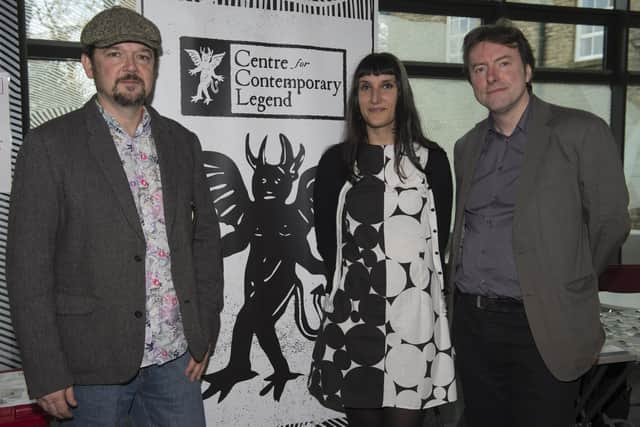Conspiracy theories, tin foil hats and planning battles: phone mast fears are nothing new in Sheffield
and live on Freeview channel 276
Conspiracy theories around the latest generation of mobile phone technology burned through the internet like wildfire, with some falsely claiming it was the cause of Covid-19 symptoms.
Sheffielders said they received letters promoting online broadcasts by conspiracy theorist David Icke, who was later banned from YouTube for spreading 5G myths, and some believers joined anti-lockdown protests in the Peace Gardens.
Advertisement
Hide AdAdvertisement
Hide AdMeanwhile, phone companies building 5G networks around the country reported dozens of attacks on engineers and masts.


Fear around the technology hit fever pitch but David Clarke, associate professor at Sheffield Hallam University and co-founder of the Centre for Contemporary Legend who has researched the topic, said it is nothing new.
He said: “What we have here is a long-running anxiety about whether phones are good or bad for health which goes back to electricity pylons, RADAR and phone masts years ago.
“Then suddenly we have this coronavirus thing come out of the blue and a series of coincidences that have led some people to connect mobile phone anxiety with the coronavirus anxiety. There is no obvious cause or connection between them at all.
Advertisement
Hide AdAdvertisement
Hide Ad“There was a man who went on YouTube back in March saying ‘isn’t it a coincidence Wuhan where the virus is said to have started is where they were rolling out 5G?’ It’s complete nonsense of course but he made that causal connection.


“That got online and people now rely totally on things people have sent them or they have seen on social media or ‘doing research’ on YouTube.
“People rely on that kind of folk knowledge in the way that people thousands of years ago if they had a sore thumb would go to the local wise person who would say ‘I heard if you rub herbs on it…’ it’s almost as though we are reverting to medieval times.”
Much like the 5G panic today, the rollout of 3G sparked a long list of fears and mobilised local communities across the country in the early 2000s.
Advertisement
Hide AdAdvertisement
Hide AdIn this region, reporters at newspapers interviewed people who believed phone masts caused a range of problems including: migraines, nose bleeds, nausea, sleep problems, cancers, epileptic fits, tingling sensations, decreased immunity, television interference, locked people out of their cars, genetically modified crops and even threw homing pigeons off course.


More fuel was put on the fire when celebrities such as Uri Geller backed protesters, as seen with stars like Wiz Khalifa and Woody Harrelson with the 5G panic.
Scared by the rumours, some took extreme measures and wallpapered their rooms with tin foil, wore tin foil hats, avoided mobile phones and vandalised masts.
One couple from Bardsey even took their case to the European Court of Human Rights, spending tens of thousands of pounds in the process, in a ‘David and Goliath’ battle against a company erecting phone masts in their community.
Advertisement
Hide AdAdvertisement
Hide AdPoliticians were also wary. For example, MP Phil Willis, who led the All Party Telecommunications Group, supported anti-mast campaigners taking a case to Parliament and Sheffield Liberal Democrats called on the ruling Labour Party to ban them altogether on council land.
Current Sheffield councillors from across the political spectrum said they received an “increased number” of emails from people worried about 5G and its imagined links to Covid-19 last year.
Labour councillor Ben Miskell said: “I think for a lot of people it’s a difficult time and they are looking for easy answers and scapegoats for things that are happening that is really awful and I think that’s what is quite dangerous about it because you can get quite vulnerable people sucked into these types of conspiracy theories and it takes over their whole world. It’s concerning.”
Rallying people against phone mast plans in the community may be easier today thanks to social media but planning rules remain firm in preventing refusals based on unevidenced health concerns.
Advertisement
Hide AdAdvertisement
Hide AdNational Planning Policy Framework states: “Planning policies and decisions should support the expansion of electronic communications networks including next generation mobile technology (such as 5G).”
It adds local authorities must determine applications on planning grounds only and not set health safeguards different from the international guidelines.
Extensive research and independent expert groups in the UK and internationally have examined all the evidence over years. Their conclusions say health effects are unlikely to occur if exposures are below international guideline levels.
The industry has voluntarily committed to comply with these guidelines and provide certificates of compliance with planning applications.
Advertisement
Hide AdAdvertisement
Hide AdDespite this, some still struggle to let go of their fears even when faced with all of the facts.
Dr Clarke said: “People rely on mobile phones but the other side of that is they distrust them and not many really know how they operate, it’s almost like a magical object.
“It’s the fear there is something about that thing you rely upon so much that is actually hurting you. That’s where all these fears about mobile phones come from.
“It’s a phenomenon known as cognitive dissonance. When someone holds really strong ideas they come to identify themselves with it, whether it be Brexit or 5G they build themselves around it and when you present them with evidence that completely destroys that belief, rather than admitting they were wrong, they find a reason for why what you are telling them isn’t true and their belief becomes stronger and they are not prepared to change it despite the evidence.
Advertisement
Hide AdAdvertisement
Hide Ad“There is something badly wrong somewhere, people just aren’t being shown how to use critical faculties and they aren’t being shown at school, college or university what is a reliable source and what is not.”
In these confusing and worrying times, local journalism is more vital than ever. Thanks to everyone who helps us ask the questions that matter by taking out a digital subscription or buying a paper.